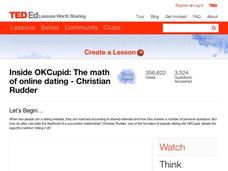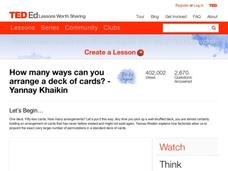Flipped Math
Calculus AB/BC - Determining Concavity of Functions over Their Domains
Time to take a second look at derivatives finding concavity. While watching the video, learners find out the definition of concavity. Individuals see how to determine whether an interval is concave up or concave down using graphs and the...
Flipped Math
Calculus AB/BC - Derivatives of tan(x), cot(x), sec(x), and csc(x)
Continue to differentiate the rest of the trigonometric functions. Pupils see the derivatives of the other four trigonometric functions and begin to memorize the rules. Learners see examples that show that the calculus portion of a...
Flipped Math
Calculus AB/BC - The Quotient Rule
Some differentiation rules are just better to memorize. The ninth lesson in a unit of 11 presents the quotient rule to pupils for them to memorize. Learners use the quotient rule to determine the derivative of two quotients after seeing...
Flipped Math
Calculus AB/BC - The Product Rule
There's more to derivatives of multiplication than simply the product of the derivatives. A helpful video gives learners the product rule of finding the derivative of the product of two functions. Pupils find the derivatives of functions...
Flipped Math
Calculus AB/BC - Derivatives of cos(x), sin(x), e^x, and ln(x)
The shortcuts are not just for polynomial functions. Pupils learn the derivatives of the two basic trigonometric functions, cosine and sine. The video provides the derivatives for exponential and logarithmic functions. Learners work...
Flipped Math
Calculus AB/BC - Derivative Rules: Constant, Sum, Difference, and Constant Multiple
Use derivatives to find equations of lines. Pupils learn more rules to use as shortcuts to find derivatives. Using the rules, they find the equations of the tangent line and the normal line at a given point. Scholars then apply the new...
Flipped Math
Calculus AB/BC - The Power Rule
There has to be a quicker way. Pupils learn the power rule that allows for a shortcut to take the derivative of terms to a power. Using the newly found rule, scholars find the slope of the tangent line to a function at a given x value....
Flipped Math
Calculus AB/BC - Connecting Differentiability and Continuity
Despite what you thought, you can differentiate between continuity and differentiability. Using a short lesson, pupils learn how differentiability and continuity relate to each other. It provides three descriptions of when a function is...
Flipped Math
Calculus AB/BC - Estimating Derivatives of a Function at a Point
It seems like it should be about three. Pupils learn to get an estimate of the derivative of a function at a point by using the derivative functionality of their graphing calculators. They take that information to determine the equation...
Flipped Math
Calculus AB/BC - Defining the Derivative of a Function and Using Derivative Notation
Pupils learn how to find the derivative of a function by applying the definition using limits. Learners understand that the derivative provides the slope of the tangent line and use that information to find the equation of the tangent...
Flipped Math
Calculus AB/BC - Average and Instantaneous Rate of Change
Ramp up the average rate of change—instantly. Learners use their knowledge of the formula to find the average rate of change to find the instantaneous rate of change. The presenter shows pupils an interactive that demonstrates finding...
Curated OER
Inside OKCupid: The Math of Online Dating
Capture the hearts of your young statisticians with this real-life example of using statistics in online dating. The use of average and geometric mean are discussed in the context of creating the algorithm used to connect people.
TED-Ed
How Many Ways Can You Arrange a Deck of Cards?
Entertain and grab your learners' attention with a short video clip that engagingly teaches the concept of a permutation and how a factorial is a wonderful shortcut for theoretical probability calculations.
TED-Ed
From Aaliyah to Jay-Z: Captured Moments in Hip-hop History
To take "the definitive portrait of that person in that moment" is the quest of photographer and hip-hop historian Jonathan Mannion. In this short video, Mannion details his dedication to his art and the process he goes through to catch...
TED-Ed
How to Choose Your News
How do you get the truth unfiltered by middlemen? Tune into various sources and note the differences is the suggestion in a short video that begins by providing examples of how media gatekeepers have manipulated information and how those...
TED-Ed
How to Speak Monkey: The Language of Cotton-Top Tamarins
Tamarin monkey language can be categorized by stem upsweep, duration, peak frequency, and frequency change. Although other complex terminology is used to describe the 38 calls of this species, the video is easy to follow and a...
TED-Ed
The Colossal Consequences of Supervolcanoes
The threat posed by super volcanoes is explored in a short video that reviews the destruction caused by Mount Tambora in 1815 and by Peru's Huaynaputina in 1600. Think it can't happen again? The narrator contends that the explosive...
TED-Ed
Tycho Brahe, the Scandalous Astronomer
Who says scientists are boring geeks? Certainly not the narrator of a short video who dishes up the scandals associated with Tycho Brahe, a Danish scientist and alchemist (now that's two labels you don't often see together) who used...
TED-Ed
A Digital Reimagining of Gettysburg
Why would Robert E. Lee order Pickett's Charge, an action that changed the course of the Civil War? Geographer and historian Anne Knowles uses digital technology to explain what she thinks is the missing piece in trying to understand...
TED-Ed
The Fundamentals of Space-Time: Part 3
If you weren't already blown away by first two installments, check out this clip on how gravity and space-time interact! Our physicist friends, Pontzen and Whyntie, continue their discussion of these motion concepts for your high...
TED-Ed
Sugar: Hiding in Plain Sight
Did you know that you can find added sugars in three-quarters of the foods you find in grocery stores? Invite your learners to consider how much sugar exists in the food products we eat on a day-to-day basis, as well as to learn about...
Howard Hughes Medical Institute
The Making of the Fittest: Natural Selection in Humans
Sickle cell disease only occurs when both parents contribute the trait, and mostly in those of African descent. Where did it come from? How did it evolve? Tony Allison, a molecular biologist, noticed a connection between sickle cell and...
Howard Hughes Medical Institute
The Making of the Fittest: Got Lactase? The Co-evolution of Genes and Culture
Got milk? Only two cultures have had it long enough to develop the tolerance of lactose as an adult. Learn how the responsible genes evolved along with the cultures that have been consuming milk. This rich film is supplied with a few...
Howard Hughes Medical Institute
The Making of the Fittest: Natural Selection and Adaptation
The pocket mouse can be light brown like the sands of the desert, or dark brown like the volcanic lava flows that are interspersed throughout New Mexico's Valley of Fire. It seems that predators have weeded out light colored mice in this...

























